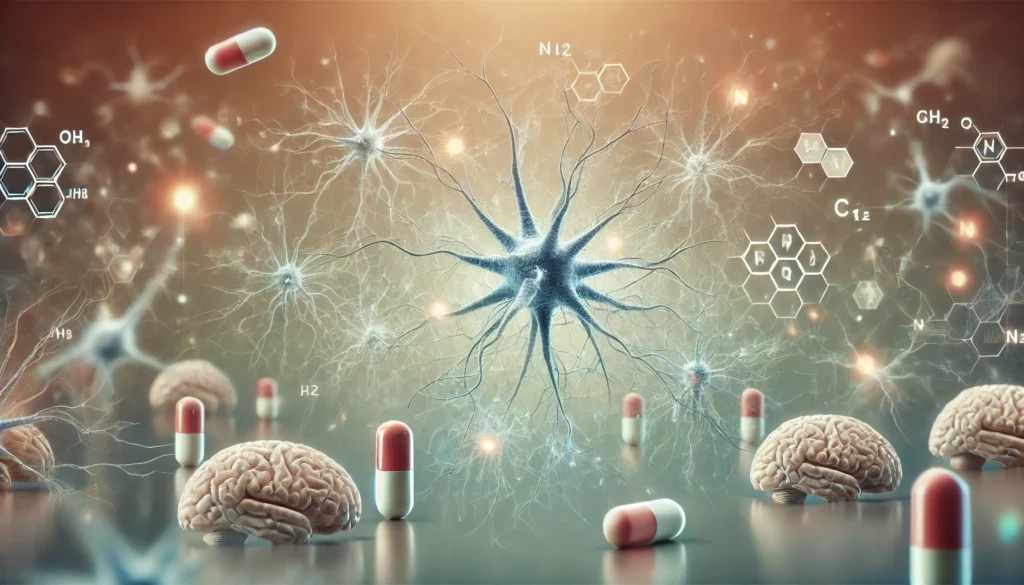Vitamin B12, also known as cobalamin, is a water-soluble vitamin crucial for the formation of red blood cells and the synthesis of DNA. It also plays a significant role in the health of nerve cells and the production of neurotransmitters, which are chemicals that transmit signals in the brain.
You may also like: Understanding the Science Behind Lost Memory
Vitamin B12: An Overview
Vitamin B12 is a complex vitamin vital for various bodily functions. It helps in the production of red blood cells, which carry oxygen throughout the body, ensuring that tissues receive the nutrients they need to function optimally. Additionally, B12 is involved in the metabolism of every cell, making it indispensable for maintaining energy levels and overall health.
B12’s Role in Nerve Health
One of the primary roles of Vitamin B12 is supporting the health of nerve cells. It is crucial for forming and maintaining the myelin sheath, a protective covering that surrounds nerves. This sheath facilitates the rapid transmission of electrical impulses along nerve cells, ensuring efficient communication within the nervous system.
Neurotransmitter Production and B12
B12 is also involved in the synthesis of neurotransmitters, which are essential for brain function. Neurotransmitters such as serotonin and dopamine play a crucial role in mood regulation, cognitive function, and memory. Adequate levels of B12 help maintain the balance and production of these chemicals, promoting mental clarity and emotional stability.
The Connection Between Vitamin B12 and Memory
Vitamin B12 is indispensable for brain health. The myelin sheath, a protective layer around nerves, relies heavily on B12 for maintenance. Without sufficient B12, myelin can deteriorate, leading to nerve damage and cognitive decline. This deficiency can manifest as memory loss, confusion, and even depression, underscoring the critical nature of B12 for maintaining mental clarity and focus.
Myelin Sheath and Memory
The myelin sheath is crucial for protecting nerves and ensuring efficient signal transmission. When B12 levels are low, this sheath can become compromised, leading to slower and less accurate communication between neurons. This deterioration can significantly impact memory, as efficient neuron communication is essential for storing and recalling information.
Cognitive Decline and B12 Deficiency
A lack of B12 can lead to a gradual cognitive decline. Memory loss is often one of the first signs, but as the deficiency progresses, it can affect other cognitive functions such as attention, reasoning, and problem-solving. This decline can severely impact daily life, making tasks that were once easy seem challenging.
Emotional and Psychological Impact
The psychological effects of B12 deficiency can be profound. Individuals may experience mood swings, depression, and anxiety. These emotional changes can further exacerbate memory problems, creating a cycle where mental health issues and cognitive decline feed into one another.
Signs and Symptoms of B12 Deficiency
B12 deficiency can be insidious, with symptoms that are often subtle and gradual. It’s important to recognize these early signs to prevent long-term cognitive damage:
Memory Loss and Confusion
One of the most alarming signs of B12 deficiency is memory impairment. Individuals may struggle to recall names, dates, or even recent events. This can be distressing and frustrating, not only for the individual but also for loved ones. Early recognition of these memory issues can lead to timely intervention.
Fatigue and Physical Weakness
Chronic fatigue and weakness are common symptoms of B12 deficiency. While they may not seem directly related to memory, these symptoms can exacerbate cognitive issues by reducing concentration and mental stamina. As energy levels drop, mental processes slow, making it harder to focus and remember information.
Mood Changes and Depression
Depression and mood swings are frequently associated with B12 deficiency. B12 is essential for serotonin production, a neurotransmitter that regulates mood. Without adequate B12, serotonin levels can drop, leading to emotional instability, which can further impair cognitive function.
Neurological Symptoms
B12 deficiency can also cause neurological symptoms such as tingling sensations in the hands and feet, difficulty walking, and balance issues. These symptoms are a result of nerve damage caused by inadequate B12 levels, highlighting the vitamin’s role in maintaining neurological health.

Broader Cognitive Decline
Beyond memory loss, B12 deficiency can affect broader cognitive abilities. Individuals may find it challenging to solve problems, make decisions, or process complex information. This cognitive decline can impact professional and personal life, making it essential to address the deficiency promptly.
Causes of B12 Deficiency
B12 deficiency is primarily caused by inadequate dietary intake or absorption.
Dietary Deficiency
Vitamin B12 is naturally found in animal products such as meat, eggs, and dairy. Thus, vegetarians and vegans are at a higher risk of deficiency. Individuals who follow plant-based diets need to be particularly vigilant about their B12 intake, possibly requiring supplements or fortified foods to meet their nutritional needs.
Age-Related Absorption Issues
As we age, our body’s ability to absorb B12 from food decreases. This is due to reduced stomach acid production, which is necessary for B12 absorption. Older adults may need to monitor their B12 levels more closely and consider supplements to prevent deficiency.
Medical Conditions Affecting Absorption
Certain medical conditions can interfere with B12 absorption. Conditions such as pernicious anemia, which affects the stomach lining, or gastrointestinal disorders like Crohn’s disease, can hinder the body’s ability to absorb B12 effectively. Individuals with these conditions may require regular B12 monitoring and supplementation.
Lifestyle Factors
Certain lifestyle factors can contribute to B12 deficiency. Excessive alcohol consumption can impair B12 absorption, while smoking can increase B12 requirements. Additionally, prolonged use of certain medications, such as proton pump inhibitors or metformin, can affect B12 absorption, increasing the risk of deficiency.
Diagnosing and Treating B12 Deficiency
If you suspect a B12 deficiency, a healthcare professional can confirm it through blood tests that measure B12 levels and assess for anemia.
Diagnostic Tests and Procedures
Blood tests are the primary diagnostic tool for assessing B12 levels. These tests not only measure the concentration of B12 in the blood but also check for signs of anemia and elevated homocysteine levels, which can indicate a deficiency. Early diagnosis is crucial for effective treatment and preventing long-term damage.
Dietary Adjustments
For those with dietary deficiencies, increasing the intake of B12-rich foods is essential. Incorporating more meat, eggs, and dairy products into the diet can help boost B12 levels. For vegetarians and vegans, fortified foods such as cereals, plant-based milk, and nutritional yeast can provide alternative sources of B12.

B12 Supplements and Injections
Oral supplements and B12 injections are effective treatments for deficiency. Oral supplements are suitable for those with mild deficiencies, while injections may be necessary for individuals with absorption issues or severe deficiencies. Regular supplementation can quickly restore B12 levels and improve symptoms.
Ongoing Monitoring and Maintenance
Regular monitoring of B12 levels is important for those at risk of deficiency. Periodic blood tests can help ensure that B12 levels remain within the optimal range, preventing future deficiencies. Maintaining adequate B12 levels is essential for cognitive health and overall well-being.
Is Memory Loss Due to B12 Deficiency Reversible?
The good news is that memory loss caused by B12 deficiency is often reversible, especially when caught early. Treatment can lead to significant improvements in cognitive function and overall mental health.
Early Intervention and Recovery
Prompt treatment of B12 deficiency is key to reversing memory loss. Early intervention can halt the progression of cognitive decline and allow for recovery of memory and other cognitive functions. The sooner B12 levels are restored, the better the chances of full recovery.
Cognitive Exercises and Rehabilitation
Engaging in cognitive exercises can support memory recovery. Activities such as puzzles, memory games, and learning new skills stimulate the brain and promote neural connections. These exercises, combined with medical treatment, can enhance cognitive rehabilitation.
Holistic Lifestyle Changes
A holistic approach to treatment can further support memory recovery. Combining medical interventions with lifestyle changes, such as a balanced diet, regular exercise, and stress management, can improve overall brain health. These changes contribute to long-term cognitive resilience and mental acuity.
The Future of B12 and Brain Health
The relationship between B12 and brain health continues to be a subject of scientific inquiry. Researchers are exploring the potential of B12 in preventing neurodegenerative diseases such as Alzheimer’s. As our understanding deepens, the importance of maintaining adequate B12 levels for cognitive longevity becomes increasingly clear.
Ongoing Research and Discoveries
Research into B12’s role in brain health is ongoing. Scientists are investigating how B12 can prevent or delay the onset of neurodegenerative diseases. These studies may lead to new treatments and interventions that leverage B12’s protective effects on the brain.
B12 and Neurodegenerative Diseases
There is growing interest in the potential of B12 to combat neurodegenerative diseases. Some studies suggest that maintaining adequate B12 levels may reduce the risk of conditions like Alzheimer’s and Parkinson’s. Further research is needed to confirm these findings and develop effective strategies for prevention.
Public Health Implications
As awareness of B12’s importance grows, public health initiatives may focus more on ensuring adequate B12 intake across populations. Educational campaigns and policy changes could promote B12 supplementation and fortification, especially in vulnerable groups such as the elderly and those with dietary restrictions.

Conclusion
Vitamin B12 is more than just a nutrient; it’s a cornerstone of brain health. Recognizing the signs of deficiency and understanding its impact on memory can empower individuals to take proactive steps in maintaining their cognitive well-being. Whether through dietary changes, supplementation, or medical intervention, addressing B12 deficiency is a crucial step in preserving memory and mental acuity.
By weaving together historical insights, current research, and practical advice, we hope this article serves as a comprehensive resource for those seeking to understand and combat B12 deficiency-related memory issues. The importance of Vitamin B12 in cognitive health cannot be overstated, and ensuring adequate levels is vital for a healthy, functioning brain.
Further Reading:
Vitamin B12 deficiency can be sneaky and harmful
Cognitive impairment and vitamin B12: a review
Low Vitamin B12 Levels: An Underestimated Cause Of Minimal Cognitive Impairment And Dementia
Important Note: The information contained in this article is for general informational purposes only, and should not be construed as health or medical advice, nor is it intended to diagnose, prevent, treat, or cure any disease or health condition. Before embarking on any diet, fitness regimen, or program of nutritional supplementation, it is advisable to consult your healthcare professional in order to determine its safety and probable efficacy in terms of your individual state of health.
Regarding Nutritional Supplements Or Other Non-Prescription Health Products: If any nutritional supplements or other non-prescription health products are mentioned in the foregoing article, any claims or statements made about them have not been evaluated by the U.S. Food and Drug Administration, and such nutritional supplements or other health products are not intended to diagnose, treat, cure, or prevent any disease.


